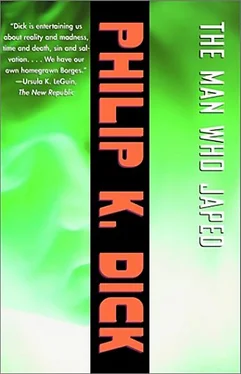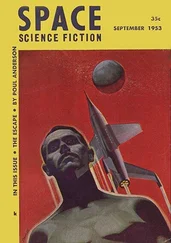Philip Dick - THE MAN WHO JAPED
Здесь есть возможность читать онлайн «Philip Dick - THE MAN WHO JAPED» весь текст электронной книги совершенно бесплатно (целиком полную версию без сокращений). В некоторых случаях можно слушать аудио, скачать через торрент в формате fb2 и присутствует краткое содержание. Жанр: Фантастика и фэнтези, на английском языке. Описание произведения, (предисловие) а так же отзывы посетителей доступны на портале библиотеки ЛибКат.
- Название:THE MAN WHO JAPED
- Автор:
- Жанр:
- Год:неизвестен
- ISBN:нет данных
- Рейтинг книги:3 / 5. Голосов: 1
-
Избранное:Добавить в избранное
- Отзывы:
-
Ваша оценка:
- 60
- 1
- 2
- 3
- 4
- 5
THE MAN WHO JAPED: краткое содержание, описание и аннотация
Предлагаем к чтению аннотацию, описание, краткое содержание или предисловие (зависит от того, что написал сам автор книги «THE MAN WHO JAPED»). Если вы не нашли необходимую информацию о книге — напишите в комментариях, мы постараемся отыскать её.
THE MAN WHO JAPED — читать онлайн бесплатно полную книгу (весь текст) целиком
Ниже представлен текст книги, разбитый по страницам. Система сохранения места последней прочитанной страницы, позволяет с удобством читать онлайн бесплатно книгу «THE MAN WHO JAPED», без необходимости каждый раз заново искать на чём Вы остановились. Поставьте закладку, и сможете в любой момент перейти на страницу, на которой закончили чтение.
Интервал:
Закладка:
There was no field to locate; all Hokkaido was a field. He tripped the landing release, and the ship coasted of its own accord across the surface of ash. Eventually the pattern of
Sugermann's transmitter was intercepted and the ship changed its course. The pattern led it in and brought it down. With a faint bump and a few rattles the ship eased to a stop. Now the only sound was the hum of batteries recharging.
Allen opened the door and stepped haltingly out. The ash sank under his feet; it was like standing on mush. The ash was complicated, a mixture of organic and inorganic compounds. A fusion of people and their possessions into a common gray-black blur. During the postwar years the ash had made good mortar.
To his right was an insignificant glow. He walked toward it, and ultimately it became Tom Gates waving a flashlight.
"Morec to you," Gates said. He was a bony, pop-eyed shrimp with uncombed hair and a nose bent like a macaw's.
"How're things?" Allen asked, as he plodded after the gaunt shape toward the neck of the underground shelter. Built during the war, the shelter was still intact. Gates and Sugermann had reinforced and improved it, Gates pounding nails and Sugermann overseeing.
"I was expecting Sugie. It's almost dawn on this side; he's been out all night buying supplies." Gates giggled, a nervous high-pitched twitter. "Trading big. We got a good hand, these days. Plenty of stuff people want; don't kid yourself."
The stairs brought them down to the shelter's main room. It was a litter of books, furniture, paintings, cans and boxes and jars of food, carpets and bric-a-brac and just plain junk. The phonograph was blaring a Chicago version of "I Can't Get Started." Gates turned it down, grinning.
"Make yourself at home." He tossed a box of crackers to Allen, and then a wedge of cheddar cheese. "Not hot—perfectly safe. Man, we've been digging, digging. Under all this ash, way down. Gates and Sugermann, archeologists for hire."
Remnants of the old. Tons of usable, partly usable, and ruined debris, objects of priceless worth, trinkets, indis- criminate trash. Allen seated himself on a carton of glassware. Vases and cups and tumblers and cut crystal.
"Pack rats," he said, examining a chipped bowl designed by some long-dead craftsman of the twentieth century. On the bowl was a design: a faun and hunter. "Not bad."
"Sell it to you," Gates offered. "Five bucks."
"Too much."
"Three bucks, then. We've got to move this stuff. Fast turnover, assure profit." Gates giggled happily. "What do you want? Bottle of Beringer's chablis? One thousand dollars. Copy of the Decameron? Two thousand dollars. Electric waffle iron?" He computed. "Depends on if you want the kind becomes a sandwich grill. That's more."
"Nothing for me," Allen murmured. Before him was a huge pile of moldering newspapers, magazines, books, tied with brown cord. Saturday Evening Post, the top one read. "Six years of the Post," Gates said. "From 1947 to 1952. Lovely condition. Say, fifteen bills." He pawed into an opened stack beside the Posts, ripping and shredding violently. "Here's a sweet item. Yale Review. One of those ‘little' magazines. Got stuff on Truman Capote, James Jones." His eyes sparkled slyly. "Plenty of sex."
Allen examined a faded, water-logged book. It was cheaply bound, a bulging pulp with stained pages.
THE INDEFATIGABLE VIRGIN
Jack Woodsby
Opening at random he came across an absorbing paragraph.
"... Her breasts were like two cones of white marble bulging within the torn covering of her thin silk dress. As he pulled her against him he could feel the hot panting need of her wonderful body.
Her eyes were half-shut and she was moaning faintly. ‘Please,' she gasped, trying feebly to push him away. Her dress slipped entirely aside, re- vealing the pulsing fullness of her taut, firm flesh..."
"Good grief," Allen said.
"Fine book," Gates remarked, squatting down beside him. "Lots more. Here." He dug out another and pushed it at Allen. "Read."
I, THE KILLER
The author's name was blurred by time and decay. Opening the tattered paper-covered book, Allen read:
"... Again I shot her in the groin. Guts and blood spilled out, soaking through her torn skirt.
The floor under my shoes was slippery with her gore. I accidently crushed one of her mangled breasts under my heel, but what the hell, she was dead..."
Bending down, Allen pulled out a fat, mildewed, gray-bound book and opened it.
"... Stephen Dedalus watched through the webbed window the lapidary's fingers prove a time- dulled chain. Dust webbed the window and the showtrays. Dust darkened the toiling fingers with their vulture nails..."
"That's a hot one," Gates said, peering over his shoulder. "Go on, look through it. At the end especially."
"Why is this here?" Allen asked.
Gates clapped his hands together and writhed. "Man, that's the one. That's the spiciest of them all. You know how much I get for a copy of that? Ten thousand dollars!" He tried to grab the book, but Allen hung onto it.
"... Dust slept on dull coils of bronze and silver, lozenges of cinnabar, on rubies, leprous and wine- dark stones..."
Allen put down the book. "That's not bad." It gave him a queer feeling, and he reread the passage carefully.
There was a scraping at the stairs and Sugermann entered. "What's not bad?" He saw the book and nodded. "James
Joyce. Excellent writer. Ulysses brings us a good deal, these days. More than Joyce himself ever got." He tossed down his armload. "Tom, there's a shipload up on the surface. Don't let me forget. We can get it down later." He, a heavy-set, round-faced man, with a stubble of bluish beard, began peeling off his wool overcoat.
Examining the copy of Ulysses, Allen said: "Why is this book with the others? It's entirely different."
"Has the same words," Sugermann said. He lit a cigarette and stuck it in a carved, ornate ivory holder. "How are you these days, Mr. Purcell? How's the Agency?"
"Fine," he said. The book bothered him. "But this—"
"This book is still pornography," Sugermann said: "Joyce, Hemingway. Degenerate trash. The Major's first Book Committee listed Ulysses on the hex-sheet back in 1988. Here." Laboriously, he scooped up a handful of books; first one and then another was tossed into Allen's lap. "A bunch more of them. Novels of the twentieth century. All gone, now. Banned. Burned. Destroyed."
"But what was the purpose of these books? Why are they lumped with the junk? They weren't once, were they?"
Sugermann was amused, and Gates cackled and slapped his knee.
"What kind of Morec did they teach?" Allen demanded.
"They didn't," Sugermann said. "These particular novels even taught un Morec."
"You've read these?" Allen scanned the volume of Ulysses. His interest and bewilderment grew. "Why? What did you find?"
Sugermann considered. "These, as discriminated from the others, are real books."
"What's that mean?"
"Hard to say. They're about something." A smile spread across Sugermann's face. "I'm an egghead, Purcell. I'd tell you these books are literature. So better not ask me."
"These guys," Gates explained, breathing into Allen's face, "wrote it all down, the way it was back in the Age of Waste." He hammered a book with his fist. "This tells. Everything's here."
"But these ought to be preserved," Allen said. "They shouldn't be tossed in with the trash. We need them as historical records."
"Certainly," Sugermann said. "So we'll know what life was like, then."
"They're valuable."
"Very valuable."
Angrily, Allen said: "They tell the truth!"
Sugermann bellowed with laughter. He got out a pocket handkerchief and wiped his eyes. "That's so, Purcell. They tell the truth, the one and only absolute truth." Suddenly he stopped laughing. "Tom, give him the Joyce book. As a present from you and me."
Читать дальшеИнтервал:
Закладка:
Похожие книги на «THE MAN WHO JAPED»
Представляем Вашему вниманию похожие книги на «THE MAN WHO JAPED» списком для выбора. Мы отобрали схожую по названию и смыслу литературу в надежде предоставить читателям больше вариантов отыскать новые, интересные, ещё непрочитанные произведения.
Обсуждение, отзывы о книге «THE MAN WHO JAPED» и просто собственные мнения читателей. Оставьте ваши комментарии, напишите, что Вы думаете о произведении, его смысле или главных героях. Укажите что конкретно понравилось, а что нет, и почему Вы так считаете.









